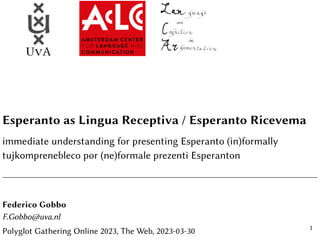
Esperanto as Lingua Receptiva / Esperanto Ricevema
- 1. Esperanto as Lingua Receptiva / Esperanto Ricevema immediate understanding for presenting Esperanto (in)formally tujkomprenebleco por (ne)formale prezenti Esperanton Federico Gobbo F.Gobbo@uva.nl Polyglot Gathering Online 2023, The Web, 2023-03-30 1
- 2. #1: Lingua Receptiva aut Franca?
- 3. 2
- 4. 3
- 5. Lingua Franca: a function, not a language / funkcio, ne lingvo From / El: Lingua Franca: Chimera or Reality 4
- 6. Esperanto & English as Linguas Francas / lingvafrankae DOI 10.17645/si.v9i1.3662 5
- 7. 6
- 8. 7
- 9. 8
- 10. 9
- 11. 10
- 12. Lingua Receptiva (LaRa): reference / referenco DOI 10.1080/14790718.2013.789519 11
- 13. Many wordings for: / Multaj vortigoj por: LaRa DOI 10.1080/14790718.2013.789519 12
- 14. LaRa: two main features / du ĉefaj trajtoj DOI 10.1080/14790718.2013.789519 13
- 15. The example by ten Thije (2013) illustrated 14
- 16. The topic of this talk / La temo de ĉi prelego 15
- 17. #1: Esperanto Receptiva / Ricevema
- 18. Introducing / Enkondukante: EspRa By definition, Esperanto Receptiva (EspRa) is its use as a lingua receptiva. Unlike common usage in the Esperanto community of practice, here, the speaker talks and shows writings in Esperanto to illustrate the language to the listener, who by its own answers in whatever language the Esperanto speaker understands, for the purpose of following the illustration itself. My original definition Laŭdifine, Esperanto Ricevema (EspRa) reprezentas la lingvon kiel ‘ling- vareceptivaon’ (LaRao). Malsimile al la kutima uzo inter la esperantistaro, ĉi tie la parolanto parolas kaj montras skribaĵojn en Esperanto por klarigi la lingvon al la aŭskultanto, kiu siavice respondas en ĉiu ajn lingvo kiun la parolanto komprenas, cele al sekvado de la klarigo mem. Mia originala difino 16
- 19. Experience at the: / Sperto ĉe la: “speak-dating” @EUNIC NL federicogobbo.name/homosum/2022/10/03/fulmoprezenti-esperanton/ 17
- 20. Tip / Konsileto 1: prepare the material / pretigu la materialon 18
- 21. Tip / Konsileto 2: be flexible / estu fleksebla 19
- 22. Tip / Konsileto 3: explain the endings / klarigu la finaĵojn “Klimata aktivulo” may suffice / eble sufiĉas 20
- 23. Tip / Konsileto 3: explain the endings / klarigu la finaĵojn “Klimata aktivulo” may suffice / eble sufiĉas • klimat/a aktiv|ul/o • klimat/o • aktiv/a • ul/o • klimat/e • aktiv/o • (…) 20
- 24. Tip / Konsileto 4: avoid participes / evitu la participojn • Mi estas manĝanta → Mi nun manĝas 21
- 25. Tip / Konsileto 4: avoid participes / evitu la participojn • Mi estas manĝanta → Mi nun manĝas • Mi estas manĝinta → Mi ĵus manĝas 21
- 26. Tip / Konsileto 4: avoid participes / evitu la participojn • Mi estas manĝanta → Mi nun manĝas • Mi estas manĝinta → Mi ĵus manĝas • Mi estas manĝonta → Mi baldaŭ manĝas 21
- 27. Tip / Konsileto 4: avoid participes / evitu la participojn • Mi estas manĝanta → Mi nun manĝas • Mi estas manĝinta → Mi ĵus manĝas • Mi estas manĝonta → Mi baldaŭ manĝas • Mi estis manĝonta → Mi baldaŭ manĝis 21
- 28. Tip / Konsileto 4: avoid participes / evitu la participojn • Mi estas manĝanta → Mi nun manĝas • Mi estas manĝinta → Mi ĵus manĝas • Mi estas manĝonta → Mi baldaŭ manĝas • Mi estis manĝonta → Mi baldaŭ manĝis • Mi estos manĝonta → Mi baldaŭ manĝos 21
- 29. Tip / Konsileto 4: avoid participes / evitu la participojn • Mi estas manĝanta → Mi nun manĝas • Mi estas manĝinta → Mi ĵus manĝas • Mi estas manĝonta → Mi baldaŭ manĝas • Mi estis manĝonta → Mi baldaŭ manĝis • Mi estos manĝonta → Mi baldaŭ manĝos • (…) 21
- 30. Tip / Konsileto 5: avoid correlatives / evitu la korelativojn • kiam → En kiu momento / En kiu tempo 22
- 31. Tip / Konsileto 5: avoid correlatives / evitu la korelativojn • kiam → En kiu momento / En kiu tempo • Kie → En kiu loko 22
- 32. Tip / Konsileto 5: avoid correlatives / evitu la korelativojn • kiam → En kiu momento / En kiu tempo • Kie → En kiu loko • Kiel → En kiu maniero / Kiamaniere 22
- 33. Tip / Konsileto 5: avoid correlatives / evitu la korelativojn • kiam → En kiu momento / En kiu tempo • Kie → En kiu loko • Kiel → En kiu maniero / Kiamaniere • (…) 22
- 34. Final remark / Fina rimarko
- 35. 23
- 36. Thank You for Your Attention! / Dankon Pro Via Atento! Ä Federico Gobbo ( he/him Á lui Á li(n) Á hij/hem ) Nj federicogobbo.name University of Amsterdam a f.gobbo@uva.nl Ŵ uva.nl/profile/f.gobbo Social media profiles f linkedin.com/in/federicogobbo/ ƶ https://climatejustice.social/@goberiko į facebook.com/federico.gobbo q instagram.com/la.profesoro § slideshare.net/goberiko Messanging apps À WhatsApp +39 345 5135665 ŵ Telegram goberiko ¦ WeChat goberiko Crowdfunding platforms cc en.liberapay.com/federico.gobbo/ (recurrent) K buymeacoffee.com/la.profesoro/ (one-time) cK ko-fi.com/federicogobbo/ (one-time & recurrent)
